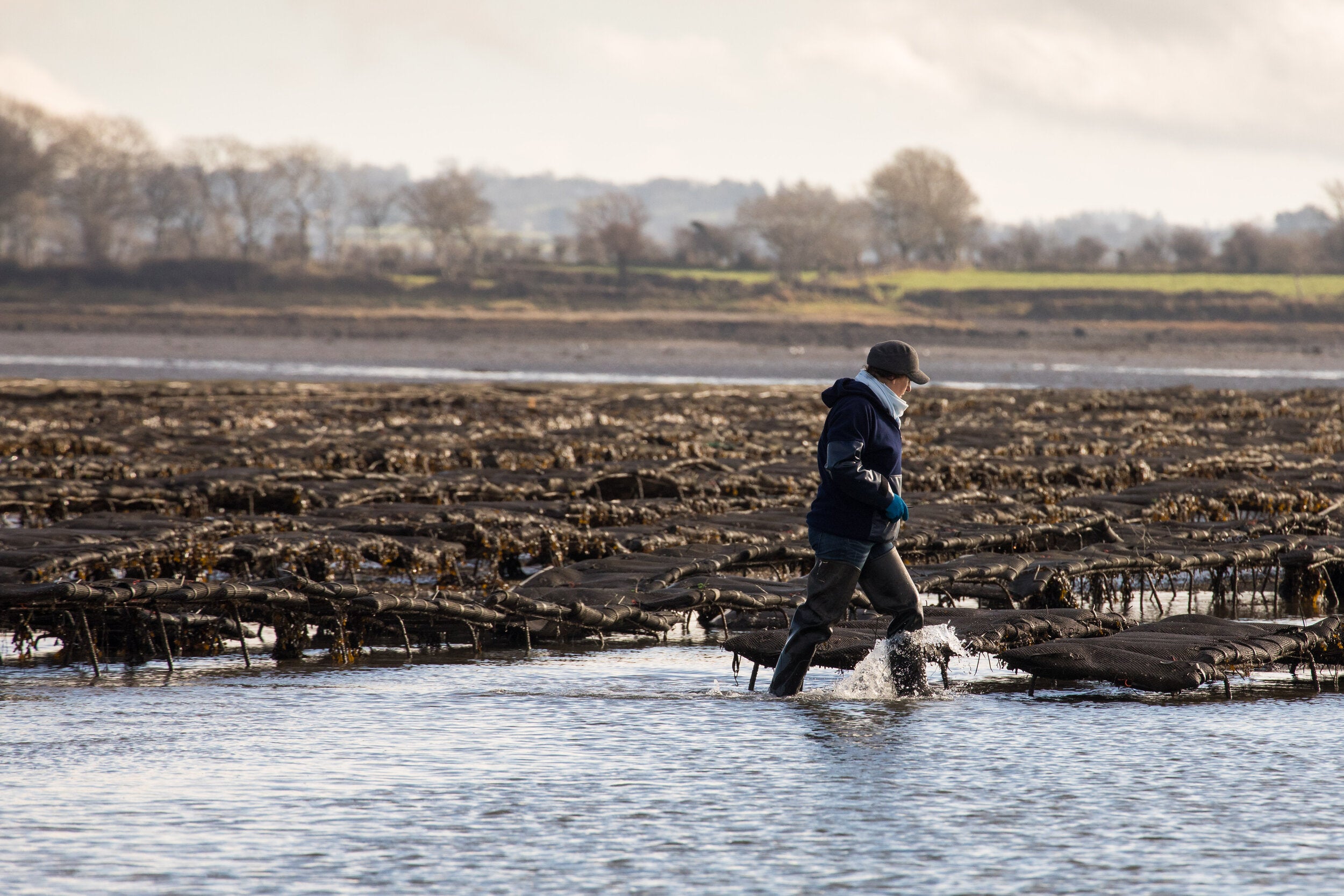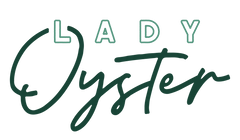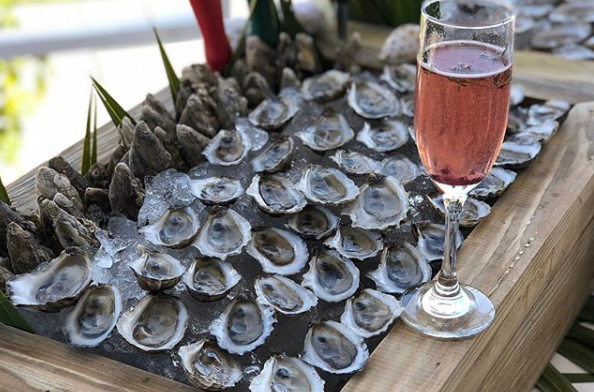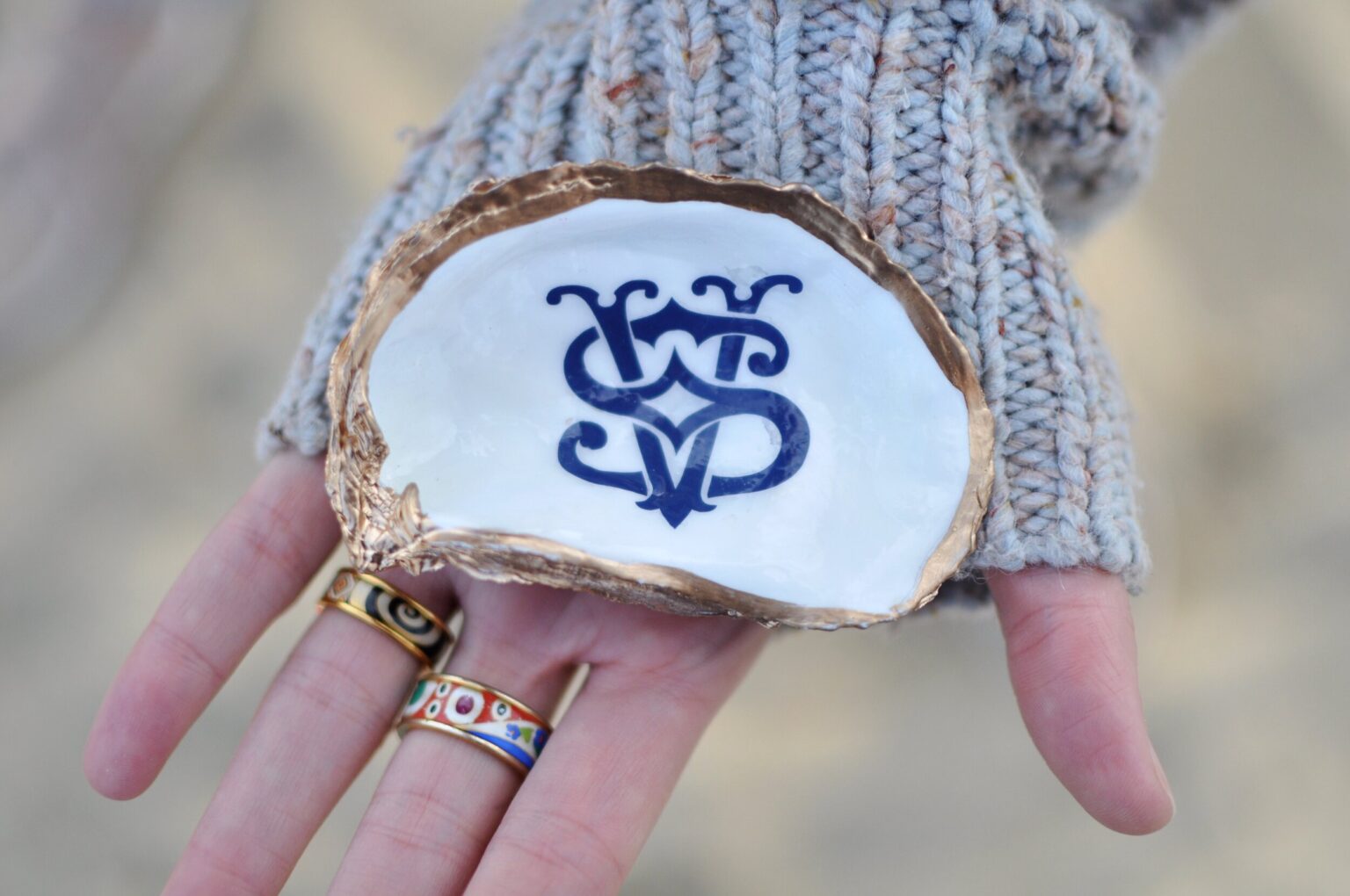A Passion Found in a "Shelly Place": The Story of Marie-Aude Danguy and Triskell Seafood

Have you ever found a special corner of the world, and never wanted to leave? Most of us have experienced it at least once. We’ve dipped our toes into sandy shores and contently swelled. We’ve felt overwhelmed and inspired all at the same time - never wanting a trip to end and contemplating the consequences if we stayed. In the end, many of us simply return home with a little heartache and a handful of memories.
With that said, it’s rare to meet someone who found their perfect “Shelly Place” and engineered a way to stay, then exchanged her “corporate suits for wellies” and committed her life’s work to shellfish. I think I’ve stumbled across the next best-selling novel.
For over twenty years, Marie-Aude Danguy has been an essential component in Ireland’s oyster industry – one that continues to experience increased global demand for its high-quality shellfish. Her company, Triskell Seafood, services oyster farmers through all aspects of the business cycle, from start-up support, access to seed, gear and equipment, marketing their product, and ultimately selling and exporting their oysters to customers worldwide. Marie-Aude saw the opportunity to better connect Ireland’s oyster producers with customers, resulting in plenty of mutual success.
Triskell Seafood is based in Sligo, Ireland, a northern coastal seaport town whose name directly translates to “abounding in shells” or “shelly place.” Marie-Aude describes it as one of Ireland’s best-kept secrets, but I’ll let her explain why. Her story and passion will inspire you to eat more oysters, persevere when times are tough, and do what makes you happy.
Here is Marie-Aude’s story.

Meet Marie-Aude! Source: Triskell Seafood.
Virginia: Marie-Aude, I heard that you are a French Native, but went to Ireland on university exchange and never left. Tell me that story!
Marie-Aude: Yeah! I mean, nowadays it's quite common for students to do Erasmus, or a European exchange, but at the time there were only about twenty of us who came to Ireland, so it was the beginning of Erasmus programs, really. I originally came over to Connemara on the West Coast in a really remote place to waitress for the summer and improve my English. I had such great fun that I thought if I could get into an exchange, I would go back. So, I did. I came over for about nine months and my intention was then to do an MBA in the States… but then I just stayed! I never went further in my studies, but I have no regrets. I felt so comfortable with the Irish mentality. People are really friendly and welcoming. I met some very good friends that year when I was in university in Sligo in the Northwest, and we're still friends today. It’s lovely. It just felt natural.
After I finished my studies, there were very few jobs in Ireland, but I was determined to stay and make it, so I ended up doing a bit of everything! I got a job with a medical packaging company as a Rep. I was traveling and meeting people and it was a very clinical kind of environment. I wasn’t really enjoying it, but then I got an offer to go and work for a group of clam farmers and do their marketing, which was my background. I said I’d give it a go and see how it goes.
From the first week I was hooked. They brought me down to the shore to visit the farms and I had to swap my executive suit to wellies and I was so happy. So happy! It just fit perfectly. I became really interested in the industry and all the potential.
Sligo is a beautiful place. It’s not very well known and kept a secret, really. It’s not often visited but once people come here, they really appreciate its beauty. Sligo means “Shelly Place” and along the coast there are oyster middens, which are old oyster settlements. It just feels right - it’s all about shellfish.
Sligo is on the Atlantic Ocean, so we have big rugged coastlines, long beaches, lakes and mountains. We have over 50 shades of green, but we also get a lot of rain!
Virginia: It sounds like a dream, especially for those of us with cabin fever right now!
Marie-Aude: I really count my blessings every day! I go walking in the morning and every night. Just five minutes on the beach is so beautiful.
Virginia: How did you take the leap of faith to start your own business?
Marie-Aude: I worked for four years for a shellfish group and became very passionate about the industry. I knew it was going to be hard work, but I had tons of energy and a brilliant mentor, one of my French clients. He really believed in me and that helped as well. I think it was also the right time and the right place because the industry was just beginning to grow in Ireland. The state organizations began to give grants to farmers to develop production, but there wasn’t much thought into the marketing of it all and I could see this coming. So many people would have lots of product to sell, but Ireland itself is not a big market for shellfish - it’s all exported. I knew I had a role to play.

Walking the flats. Source: Triskell Seafood.
Virginia: What was the beginning like? Were there any major challenges in getting started?
Marie-Aude: Well, I was very young and new starting out, a foreigner, and a woman. At the time (and to an extent still) the industry was overwhelmingly male-dominated and there was an element of proving myself within that environment. I was determined to be a success but it was an additional hurdle to overcome on top of being new to the industry and the country. I don't know how it is on the ground in the States, and the gender balance is slowing changing here, but it would be great to see more women getting into farming.
Although I was concerned about all those factors, I quickly established a reputation of having strong values of being honest, loyal, and reliable, which worked in my favor. I really enjoy building relationships with people and delivering results. That’s with everyone - not just customers... It’s my team and my suppliers. Long term relationships are a good thing for staying strong in any business.
Virginia: I read that you broke into the French market initially selling clams, and then brought in oysters. I know the French are very proud of their own oyster production. I’m curious, what was that experience like?
Marie-Aude: France is the biggest producer of oysters in Europe, which is about 140,000 tonnes per year. When Ireland started, it was only a couple hundred tonnes. Now, it’s over 10,000 tonnes and it’s still a drop in the ocean to what France does! When we started exporting to France, some people saw it as a threat or new competition that would undercut them in prices. However, some French companies took an interest because they could already spot the quality in Irish oysters. This is due to the fact that the waters are very clean in Ireland. We also have loads of space with a smaller production, so we can actually produce oysters at a lower density and therefore you’ve got a better meat content in the oysters.
It’s interesting to see how things have evolved. There are a lot of French companies who have now invested in farms in Ireland. Irish producers were also buying all of their equipment from France, as there wasn’t enough manufacturing equipment in Ireland to support the industry. So, it was not just a one-way sale; Ireland was buying equipment from France and then selling their oysters back to France.
I think the French industry also took an interest in Irish growers because in Ireland, they’re very curious and they like to innovate. In France, it’s been the same farming techniques for generations. The Irish people were constantly looking at ways of reducing labor and enhancing the quality of their product. Now they are selling their oysters all around the world.

Ireland’s clean water and attention to quality attracts buyers worldwide. Source: Triskell Seafood.
Virginia: May you share more about your business diversification, like how you moved into selling equipment and apparel, consulting, and other aspects?
Marie-Aude: It happened gradually. I was going to France regularly for business trips and traveling back and forth. Some of the Irish oyster growers were asking me, “oh, can you bring this and that back - new waders, new gear, etc…” It went from bringing things back in the boot of my car to bringing container loads. It seemed like the right thing to do was to offer these services to the growers.
From then on, the vision developed to providing a complete service to the industry. The more I knew about the business, the better it became for helping people. The aim is now to be a one-stop-shop for the oyster farmers, really. We import seed for them, provide equipment, advice on the production cycle, and in the end, we buy back the oysters and export them on their behalf.

Triskell Seafood trade routes. Now also shipping equipment and clothing to the USA. Source: Triskell Seafood.
Virginia: That is fascinating! And what kind of consulting do you offer for growers starting out?
Marie-Aude: Sometimes people have ideas and want to learn best practices, quantities to start with, equipment to buy, and regulations. It’s a very heavily regulated industry so I advise people on a lot of those areas, but additionally if they want ideas on budgeting, grants or other financial advice, that’s the other side of the consulting business that I offer. I also help people when they’re ready to sell their farm, or if growers are looking for subcontracting partners. Ultimately, there are all sorts of transactions that are possible in the process.
Virginia: I’m amazed by so many areas of the oyster business that you can support.
Marie-Aude: I’m passionate about what I do, I like to see things evolving and getting better for everybody.
Virginia: Speaking of others, what’s your team like?
Marie-Aude: At the moment, I have a team of four. Office Manager,

The Triskell Seafood team. Source: Triskell Seafood.
Virginia: How has COVID-19 impacted you and your business?
Marie-Aude: It’s difficult. Oyster sales are down with restaurants closed, but we are still busy with equipment because the farming doesn’t stop. The biggest question is how long it’s going to last. It’s reassuring to see the Chinese market reopening for oysters, but at the same time, nobody knows. Right now, we’re in the growing season. The oysters are growing with nothing sold so that creates a backlog, and prices are regulated by supply and demand so that may be a challenge. It’s worrying about the sustainability of the market, and although there is help from the government to help with wages, what about the lack of space on the farm for the growing oysters? It’s difficult to know what to do because you’re dealing with nature – the oysters are growing, and you have to look after them.
Virginia: Is there a way to sell more directly to consumers?
Marie-Aude: The Irish don’t eat too much shellfish, so that’s the issue we face. It’s changing slowly, and there are a few people selling online, but the bulk of the market is export.
(Marie-Aude and I spoke for an extra twenty minutes on COVID-19, of which I will spare you. I will say thank you, Marie-Aude, for taking interest in my own personal experience through all of this!)
Virginia: Changing gears back to the oysters. What does “quality” in an oyster mean to you? What’s important for you to evaluate for your customers?
Marie-Aude: In terms of business, I know what customers are looking for. I’ve been working with some of my clients for over twenty years so some of them like a certain type, others another. For me, a quality oyster from the start has a lovely shape, because that proves that it has been cared for. When it comes to eating them, for me, a high meat content is a must. A “Speciale” oyster, as we refer to it, is one with a high meat content. It has a sweeter taste, and a long lasting one with a nutty finish. To me, that is the best.

Source: Triskell Seafood.
Virginia: Any favorite pairings?
Marie-Aude: I personally like them on the shore, as fresh as can be. At home, I may enjoy a little lemon juice in them. Occasionally, I cook them, but I think it’s a totally different product at that point. I must admit, I like them in Guinness sauce! It’s a different product, but so good. As far as something to drink, I like a glass of white wine, like a French Sancerre.

Oysters with Guinness Sauce, anyone? YUM. Source: cookingwithcurls.com
Virginia: In general, what would you say to someone starting in the shellfish industry?
Marie-Aude: The shellfish industry is just fascinating. You have to possess a real interest in it because you have to work very hard. You also have to be adaptable and think long-term because there are lots of cycles between prices going up and down, and production. It’s constant.
Personally, I like it because I feel close to nature. It’s directly linked to the tides, to the moon phase, and the weather. It’s always changing, which is so interesting. It’s not a typical 9-5 job, but I believe there’s a future in aquaculture due to the sustainability side of it, and we have to think about that in the long-term. It’s not easy, but you meet some characters in this business and if you’re a people’s person, it’s a great industry to be in. In the medical packaging industry, it felt cold and impersonal but in aquaculture, the people are grounded and I’ve actually made some really good friends over the years.

Marie-Aude interview at the shore for an Excellence in Business Award. Source: Triskell Seafood.
Virginia: To me, it sounds like you have the best of all worlds - traveling, running a business, and getting out on the water so often!
Marie-Aude: Yes. I’ve always lived by the sea. I was born by the sea, I grew up by the sea, and I was always less than a mile from it. I used to go sea fishing with my Dad, and I’ve always had a connection to it!
It’s not easy all the time. In Ireland, we get some serious storms. When I have to go see my oyster growers at low tide and it’s a storm, well, you have no choice! We’re lucky we have good protective gear because sometimes it can be really cold and miserable on the shore. We’re hard people though! There’s no doubt about it - it’s a physical job!

Source: Triskell Seafood.
Virginia: What’s your next plan and how will you continue with the business?
Marie-Aude: I’m confident we’ll bounce back from this pandemic. I’m driven and I want the business to go from strength to strength. I want to find new products to help growers with efficiency, a high-quality product, and reduced labor. I’m working on something right now! It’s not ready yet but check back with us soon.
We want to diversify the product range we are selling as well, and if we can, expand in the areas where we are buying and selling oysters as well. I think right now we’ll have to take it one week at a time for recovery, but we’ll continue on.
Virginia: Knowing you’re a big traveler, what are your bucket list items?
Marie Aude: Yeah! I was supposed to be in Prince Edward Island this month. Obviously, it’s been postponed and next year I’ll go visit. I’m a really big fan of traveling and if I can combine that with oysters, it’s like BINGO. There are a couple I’d like to visit. I’d like to go to Florida to visit Outlaw Oysters. They are one of our customers and they seem like a really interesting team! My top place to go though would be New Zealand. I love their oysters.
I’ve had some lovely oysters in Namibia, of all places! They are really good, small oysters - meaty, and perfect. I’ve done Brazil as well. But oh, the list of places to go is very long.
Virginia: As a great way to end this interview, is there anything you would like to share with the oyster community?
Marie Aude: I think my message to people is to “eat more oysters.” It’s as simple as that! The more oysters you eat, the more educated on them you become. It’s been proven over and over again that it’s a sustainable industry.
To my colleagues in the industry, I would say that it’s important more now than ever to stay connected, keep communicating and collaborating. We can all learn from each other. It’s amazing - even after 27 years in the industry, you can learn something new just by visiting people. Look at us even right now - you’re on one side of the world and we’re talking! It’s just that easy to reach out and connect, and it’s important.
Virginia: Marie-Aude, I could not agree more. It has been a privilege to have your story on Lady Oyster! You can read more about Triskell Seafood at www.triskellseafood.com and follow them on Facebook at www.facebook.com/triskellseafood! Thank you to Marie-Aude, Niamh, and the entire team for your collaboration.



